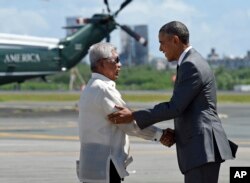President Barack Obama pledged Tuesday to help Asia-Pacific allies boost their maritime security as part of talks with leaders in the Philippine capital, Manila.
"My visit here underscores our shared commitment to the security of the waters of this region and to the freedom of navigation," Obama said.
The White House announced a package of up to $259 million in new aid over the course of two years, including $79 million for the Philippines, $40 million for Vietnam, $21 million for Indonesia and $2.5 million for Malaysia.
The U.S. is also transferring a Coast Guard cutter and a research vessel to the Philippines.
Shortly after arriving Tuesday, Obama toured the Philippine’s naval flagship, the BRP Gregorio del Pilar, which once belonged to the U.S. Coast Guard, but now operates counterterrorism missions and patrols disputed areas in the South China Sea.
Beijing’s territorial claims in the region have raised tensions with surrounding countries.
“More capable navies and partnership with the United States are critical to the security of this region," Obama said.
The leaders of 21 economies and other heads of state will take part in the influential Asia-Pacific Economic Cooperation (APEC) summit this week.
Chinese President Xi Jingping is also in Manila for the summit.
The Obama administration said it will focus on trade during the talks, although efforts to battle Islamic State militants will also be a key topic after Friday’s deadly attacks in Paris.
Obama spoke about the battle against the Islamic State during a bilateral meeting with Australian Prime Minister Malcolm Turnbull.
"We will continue shoulder to shoulder with the United States and our allies in the fight against this type of extremist violence, this type of terrorism," said Turnbull. Obama praised Australia as "the second largest contributor to the counter-ISIL coalition."
The U.S. leader is pushing to finalize the massive Trans-Pacific Partnership (TPP) agreement, a key component of the Obama administration’s rebalance to the Asia-Pacific.
The White House has pointed to the region as a populous, vibrant, and economically promising part of the world where America must engage more closely with its allies on security and the economy.
“If we’re going to continue to succeed in securing our nation and our allies, then we’re going to have to be a player and help establish the economic and security architecture in that region for this century and the centuries to come,” Obama said ahead of the summit.
He has urged the 12 nations who are party to the TPP agreement to ratify the deal as required.
The TPP faces tough resistance in the U.S. Congress where some critics argue it does not do enough to protect American workers and interests. The Obama administration says the agreement is good for U.S. business, workers and national security.
During his trip to Manila, Obama will take part in a series of bilateral meetings with other key allies and partners, including the leaders of Australia, Canada, Japan, the Philippines, Singapore and Malaysia.
The topics are expected to range from the TPP, counter-terrorism, cyber-security, maritime security, climate change and human rights.
Later in the week, President Obama will travel to Kuala Lumpur, Malaysia to take part in the annual summit meeting of the Association of Southeast Asian Nations (ASEAN).
Chris Hannas contributed to this report from Washington.









